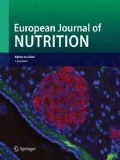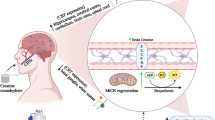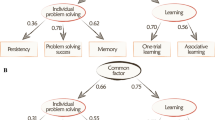Abstract
Purpose
Previously, anthocyanin-rich blueberry treatments have shown positive effects on cognition in both animals and human adults. However, little research has considered whether these benefits transfer to children. Here we describe an acute time-course and dose–response investigation considering whether these cognitive benefits extend to children.
Methods
Using a double-blind cross-over design, on three occasions children (n = 21; 7–10 years) consumed placebo (vehicle) or blueberry drinks containing 15 or 30 g freeze-dried wild blueberry (WBB) powder. A cognitive battery including tests of verbal memory, word recognition, response interference, response inhibition and levels of processing was performed at baseline, and 1.15, 3 and 6 h following treatment.
Results
Significant WBB-related improvements included final immediate recall at 1.15 h, delayed word recognition sustained over each period, and accuracy on cognitively demanding incongruent trials in the interference task at 3 h. Importantly, across all measures, cognitive performance improved, consistent with a dose–response model, with the best performance following 30 g WBB and the worst following vehicle.
Conclusion
Findings demonstrate WBB-related cognitive improvements in 7- to 10-year-old children. These effects would seem to be particularly sensitive to the cognitive demand of task.








Similar content being viewed by others
References
Benton D (2008) The influence of children’s diet on their cognition and behaviour. Brit J Nutr 47:25–36. doi:10.1007/s00394-008-3003-x
Benton D (2010) The influence of dietary status on the cognitive performance of children. Mol Nutr Food Res 54:457–470. doi:10.1002/mnfr.200900158
Hughes D, Bryan J (2003) The assessment of cognitive performance in children: considerations for detecting nutritional influences. Nutr Rev 61:413–422. doi:10.1301/nr.2003.dec.413-422
Isaacs E, Oates J (2008) Nutrition and cognition: assessing cognitive abilities in children and young people. Eur J Nutr 47:4–24. doi:10.1007/s00394-008-3002-y
Benton D (2001) Micro-nutrient supplementation and the intelligence of children. Neuro Biobehav Rev 25:297–309. doi:10.1016/S0149-7634(01)00015-X
Benton D, Roberts G (1988) Effect of vitamin and mineral supplementation on intelligence of a sample of schoolchildren. Lancet 331:140–143. doi:10.1016/S0140-6736(88)92720-1
Benton D, Brett V, Brain PF (1987) Glucose improves attention and reaction to frustration in children. Biol Psychol 24:95–100. doi:10.1016/0301-0511(87)90016-0
Busch CR, Taylor HA, Kanarek RB, Holcomb PJ (2002) The effects of a confectionery snack on attention in young boys. Physiol Behav 77:333–340. doi:10.1016/S0031-9384(02)00882-X
Kirby A, Woodward A, Jackson S, Wang Y, Crawford MA (2010) A double-blind, placebo-controlled study investigating the effects of omega-3 supplementation in children aged 8–10 years from a mainstream school population. Res Dev Disabil 31:718–730. doi:10.1016/j.ridd.2010.01.014
Vita JA (2005) Polyphenols and cardiovascular disease: effects on endothelial and platelet function. Am J Clin Nutr 81:292S–297S
Lamport DJ, Dye L, Wightman JD, Lawton CL (2012) The effects of flavonoid and other polyphenol consumption on cognitive performance: a systematic research review of human experimental and epidemiological studies. Nutr Aging 1:5–25. doi:10.3233/NUA-2012-0002
Macready AL, Kenney OB, Ellis J, Williams CM, Spencer JPE, Butler LT (2009) Flavonoids and cognitive function: a review of human randomized controlled trial studies and recommendations for future studies. Genes Nutr 4:227–242. doi:10.1007/s12263-009-0135-4
Spencer JP (2008) Food for thought: the role of dietary flavonoids in enhancing human memory, learning and neuro-cognitive performance. Proc Nutr Soc 67:238–252. doi:10.1017/S0029665108007088
Spencer JP (2010) The impact of fruit flavonoids on memory and cognition. Brit J Nutr 104:S40–S47. doi:10.1017/S0007114510003934
Shukitt-Hale B (2012) Blueberries and neuronal aging. Gerontology 58:518–523. doi:10.1159/000341101
Miller MG, Shukitt-Hale B (2012) Berry fruit enhances beneficial signaling in the brain. J Agric Food Chem 60:5709–5715. doi:10.1021/jf2036033
Rendeiro C, Vazour D, Rattray M et al (2013) Dietary levels of pure flavonoids improve spatial memory performance and increase hippocampal brain derived neurotrophic factor. PLoS One 8:e63535. doi:10.1016/j.neuropharm.2013.12.003
Williams CM, El Mohsen MA, Vauzour D et al (2008) Blueberry-induced changes in spatial working memory correlate with changes in hippocampal CREB phosphorylation and brain-derived neurotrophic factor (BDNF) levels. Free Radic Biol Med 45:295–305. doi:10.1016/j.freeradbiomed.2008.04.008
Field DT, Williams CM, Butler LT (2011) Consumption of cocoa flavanols results in an acute improvement in visual and cognitive functions. Physiol Behav 103:255–260. doi:10.1016/j.physbeh.2011.02.013
Scholey AB, French SJ, Morris PJ, Kennedy DO, Milne AL, Haskell CF (2010) Consumption of cocoa flavanols results in acute improvements in mood and cognitive performance during sustained mental effort. J Psychopharmacol 24:1505–1514. doi:10.1177/0269881109106923
Pipingas A, Silberstein RB, Vitetta L et al (2008) Improved cognitive performance after dietary supplementation with a Pinus radiata bark extract formulation. Phytother Res 22:1168–1174. doi:10.1002/ptr.2388
Ryan J, Croft K, Wesnes K et al (2008) An examination of the effects of the antioxidant Pycnogenol® on cognitive performance, serum lipid profile, endocronological and oxidative stress biomarkers in an elderly population. J Psychopharmacol 5:553–562. doi:10.1006/nimg.2000.0685
Krikorian R, Nash T, Shidler MD, Shukitt-Hale B, Joseph JA (2010) Concord grape juice supplementation improves memory function in older adults with mild cognitive impairment. Brit J Nutr 103:730–734. doi:10.1017/S0007114509992364
Krikorian R, Shidler MD, Nash TA et al (2010) Blueberry supplementation improves memory in older adults. J Agric Food Chem 58:3996–4000. doi:10.1021/jf9029332
Francis ST, Head K, Morris PG, Macdonals IA (2006) The effect of flavanol-rich cocoa on the fMRI response to a cognitive task in healthy young people. J Cardiovasc Pharm 47:S215–S220
Lamport DJ, Pal D, Mousiana C, Field DT, Williams CM, Spencer JPE, Butler LT (2015) The effect of flavanol-rich cocoa on cerebral perfusion in healthy older adults during conscious resting state: a placebo controlled, crossover, acute trial. Psychopharmacology 232:3227–3234. doi:10.1007/s00213-015-3972-4
Dodd FD (2012) The acute effects of flavonoid-rich blueberries on cognitive function in healthy younger and older adults. Dissertation. University or Reading
Rendeiro C, Vauzour D, Kean RJ et al (2012) Blueberry supplementation induces spatial memory improvements and region-specific regulation of hippocampal BDNF mRNA expression in young rats. Psychopharmacology 223:319–330. doi:10.1007/s00213-012-2719-8
Calderón-Garcidueñas L, Mora-Tiscareño A, Franco-Lira M et al (2013) Flavonol-rich dark cocoa significantly decreases plasma endothelin-1 and improves cognition in urban children. Front Pharmacol. doi:10.3389/fphar.2013.00104
Whyte A, Williams CM (2015) Effects of a single dose of a flavanoid-rich blueberry drink on memory in 8–10 year old children. Nutrition 31:531–534. doi:10.1016/j.nut.2014.09.013
Anderson P (2002) Assessment and development of executive function (EF) during childhood. Child Neuropsychol 8:71–82. doi:10.1076/chin.8.2.71.8724
Hudspeth WJ, Pribram KH (1992) Psychophysiological indices of cerebral maturation. Int J Psychophysiol 12:19–29. doi:10.1016/0167-8760(92)90039-E
Smith M, Anderson V (2009) Healthy and abnormal development of the prefrontal cortex. Dev Neurorehabil 12:279–297. doi:10.3109/17518420903090701
Hillman CH, Pontifex MB, Raine LB, Castelli DM, Hall EE, Kramer AF (2009) The effect of acute treadmill walking on cognitive control and academic achievement in preadolescent children. Neuroscience 159:1044–1054. doi:10.1016/j.neuroscience.2009.01.057
Chaddock L, Erickson KI, Prakash RS et al (2012) A functional MRI investigation of the association between childhood aerobic fitness and neurocognitive control. Biol Psychol 89:260–268. doi:10.1016/j.biopsycho.2011.10.017
Rubia K, Russell T, Overmeyer S et al (2001) Mapping motor inhibition: conjunctive brain activations across different versions of go/no-go and stop tasks. Neuroimage 13:250–261. doi:10.1006/nimg.2000.0685
Greenstein Y, Blachstein H, Vakil E (2010) Interrelations between attention and verbal memory as affected by developmental age. Child Neuropsychol 16:42–59. doi:10.1080/09297040903066891
Bisanz J, Danner F, Resnick LB (1979) Changes with age in measures of processing efficiency. Child Dev 50:132–141
Lezak MD, Howieson DB, Loring DW (2004) Neuropsychological assessment. Oxford University Press, Oxford
Stanislaw H, Todorov N (1999) Calculation of signal detection theory measures. Behav Res Methods Instrum Comput 31:137–149. doi:10.3758/BF03207704
Page EB (1963) Ordered hypothesis for multiple treatment: a significance test for linear ranks. J Am Stat Assoc 15:216–230. doi:10.1080/01621459.1963.10500843
Jeon SJ, Rhee SY, Seo JE et al (2011) Oroxylin A increases BDNF production by activation of MAPK–CREB pathway in rat primary cortical neuronal culture. Neurosci Res 69:214–222. doi:10.1016/j.neures.2010.11.008
Rendeiro C, Foley A, Lau VC et al (2014) A role for hippocampal PSA-NCAM and NMDA-NR2B receptor function in flavonoid-induced spatial memory improvements in young rats. Neuropharmacology 79:335–344. doi:10.1016/j.neuropharm.2013.12.003
Bekinschtein P, Cammarota M, Izquierdo I, Medina JH (2008) Reviews: BDNF and memory formation and storage. Neuroscientist 14:147–156. doi:10.1177/1073858407305850
Tyler WJ, Alonso M, Bramham CR, Pozzo-Miller LD (2002) From acquisition to consolidation: on the role of brain-derived neurotrophic factor signaling in hippocampal-dependent learning. Learn Mem 9:224–237. doi:10.1101/lm.51202
Hariri AR, Goldberg TE, Mattay VS, Kolachana BS, Callicott JH, Egan MF, Weinberger DR (2003) Brain-derived neurotrophic factor val66met polymorphism affects human memory-related hippocampal activity and predicts memory performance. J Neurosci 23:6690–6694
Spencer JP, Vauzour D, Rendeiro C (2009) Flavonoids and cognition: the molecular mechanisms underlying their behavioural effects. Arch Biochem Biophys 492:1–9. doi:10.1016/j.abb.2009.10.003
Rodriguez-Mateos A, Rendeiro C, Bergillos-Meca T, Tabatabaee S, George TW, Hiess C, Spencer JP (2013) Intake and time dependence of blueberry flavonoid-induced improvements in vascular function: a randomized, controlled, double-blind, crossover intervention study with mechanistic insights into biological activity. Am J Clin Nutr 98:1179–1191. doi:10.3945/ajcn.113.066639
Benton D (2002) Carbohydrate ingestion, blood glucose and mood. Neurosci Biobehav Rev. doi:10.1016/S0149-7634(02)00004-0
Dye L, Blundell J (2002) Functional foods: psychological and behavioural functions. Brit J Nutr 88:S197–S211. doi:10.1079/BJN2002684
Sawaya AL, Fuss PJ, Dallal GE, Tsay R, McCroy MA, Young V, Roberts SB (2001) Meal palatability, substrate oxidation and blood glucose in young and older men. Physiol Behav 72:5–12. doi:10.1016/S0031-9384(00)00292-4
Author information
Authors and Affiliations
Corresponding author
Ethics declarations
Conflict of interest
On behalf of all authors, the corresponding author states that there is no conflict of interest.
Electronic supplementary material
Below is the link to the electronic supplementary material.
Rights and permissions
About this article
Cite this article
Whyte, A.R., Schafer, G. & Williams, C.M. Cognitive effects following acute wild blueberry supplementation in 7- to 10-year-old children. Eur J Nutr 55, 2151–2162 (2016). https://doi.org/10.1007/s00394-015-1029-4
Received:
Accepted:
Published:
Issue Date:
DOI: https://doi.org/10.1007/s00394-015-1029-4




